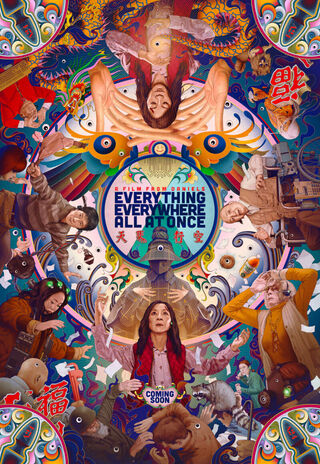Fear
“Everything Everywhere”: Multiverses, Metaverses and You
Everything Everywhere All at Once is about choices and life trajectories.
Posted March 29, 2022 Reviewed by Kaja Perina

The Daniels’ (Daniel Kwan and Daniel Scheinert) breakout spectacle Everything Everywhere All At Once just hit theaters, and being a “Superfan” of the Asian American film experience (I’ve written the “Memoirs of a Superfan” blog about Asian American film and culture for 17 years, see references), I had to see it on opening night.
Literally everyone on my feed has been raving about the film, for plenty of good reasons: centering an Asian American immigrant woman in Evelyn Wang (the incomparable Michelle Yeoh!) and Asian American cast (featuring a fantastic Ke Huay Quan as Evelyn’s husband, James Hong as her father, Stephanie Hsu as her daughter, and Jamie Lee Curtis as Deirdre, tax auditor nemesis and more); eye popping fight sequences and visual effects; an interesting (if not terribly deep) take on the multiverse; a story of intergenerational relational trauma; lots of sight gags, chuckles and quite a few belly laughs; and some nods at philosophy and mental health, including existentialism, nihilism, and youth suicide. Above all, the film highlights the possibilities and regrets of a middle-aged Asian American woman, and what it means to “come home” to yourself. It's a mid-life crisis to the point of multidimensional psychotic break - what's not to love?
My unpopular opinion is that the movie went too far in the direction of spectacle, and didn’t lean into the human element enough. There wasn’t enough payoff for me in the realm of relationship, given the (again, for me) deadening opening act of countless fight sequence after fight sequence. Let’s face it, this Superfan is more of a Happy Hour (5 hours 17 minutes about the relationships of 4 friends) and Drive My Car (3 hours, again about relationships) kind of guy. I studiously avoid most Marvel and DC films. I have never seen Inception. I only got a ticket for Eternals because of director Chloé Zhao, and even then walked out after 15 minutes. I did see and love Spiderman: Into the Spiderverse and Shang-Chi, but these were rare exceptions of outstanding writing, character development and diversity. There wasn’t enough of these for me in EEAAO – maybe I missed it, but I don’t think I saw any Black characters in the film…hmmm.
The multiverse we inhabit in our own minds is all about choice, and I generally choose depth, relationship, and presence over spectacle. The latest season of Star Trek: Discovery stands out because even in the midst of galaxies under threat (plot lines and plot holes go big, sigh), the leads take their time asking each other how they’re doing, and telling each other that they care about each other. I know, it’s a little sappy, but I so appreciate that, especially amidst pandemic, wars, and a world which can seem very antagonistic and threatening.
Choices drive the Daniels’ multiverse vision: career and love, most predominantly, but also, beneath them all, the choices of interior and relational life more generally. When Evelyn (slight spoiler) flips out and cold cocks tax auditor Deirdre because she is afraid Deirdre is trying to kill her – I felt the threat that perhaps all immigrants feel about authorities in the dominant culture.
Many immigrants flee persecution, and fear and face persecution in America as well. Asian Americans have experienced a huge and well-documented upsurge in racist incidents, violence and hate crimes in the last few years, and we are living in a time of increased fear and threats to safety and well-being, but also a time of necessary connection and affirmation. (See “Min Jin Lee’s remarks at Break the Silence rally” in references.)
And this brings up the central choice in human life. Michael Balint named “the basic fault” as the deprivation of love in early life.
We live on a spectrum of choice between autocracy/authoritarianism/power/control/hate/fear
vs.
love/relationship/nurturing/presence.
I would suggest that we all have elements of each “spirit” – and our path in the “multiverse” we inhabit in our minds depends on where we put our chips, time and again. And of course, what flourishes depends on the cultural context, making our journeys of identity, belonging and wellness a collective choice as well.
In the near future, Mark Zuckerberg and others will be offering options in the “metaverse.” I’ve imagined that Zuck has gathered our data, and could create mini-me’s and mini-you’s to play with in virtual realities. Certainly anyone who creates a metaverse “room” is "world-building." What mentality will they bring?
What might we suffer or enjoy, depending on the mentality of the “dungeon master,” who might be a de facto deity? We already have to contend with viral hate, misinformation and gaslighting in social media. The metaverse, cousin to social media, will offer fully immersive possibilities in unreality and potentially extreme bias and antagonism.
Given these dangers, what will “bring us home”? What might bring us back to reality in the reality we are living?
I hope we can follow Waymond Wang’s (Ke Huay Quan's) advice in the film: “No matter what is happening, be kind.”
(c) 2022 Ravi Chandra, M.D., D.F.A.P.A.
References
Min Jin Lee’s remarks at the Break the Silence Rally, March 16, 2022. East Wind eZine, March 19, 2022.
Chandra R. Memoirs of a Superfan blog, since 2020 at East Wind eZine.




